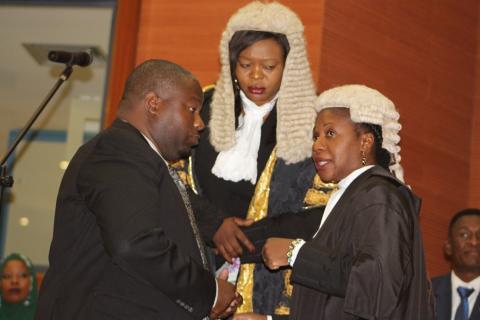The High Court sitting in Zomba has ruled in favour of Leader of Opposition Kondwani Nankhumwa by declining to meddle in parliamentary affairs stating that the leader of opposition has the privilege and discretion to appoint shadow cabinet, sitting plan arrangements, and also appointment of members in the various committees in the house.
Namalomba moved the court on 8th March 2022, for permission to apply for Judicial Review where he was seeking interim reliefs for the court to grant stay of the decisions of the leader of opposition and an interlocutory injunction restraining implementation of the decision made in Parliament, on 15th February 2022 where the Leader of opposition allocated him seat 99 and later 100 in the chamber from his initial seat number of 25. Namalomba was also concerned that Nankhumwa appointed a shadow cabinet without consultation and approval of the Democratic Progressive Party (DPP).
Nankhumwa challenged the claims made by Namalomba where he asked a number of question for the High Court to decide. For instance, Nankhumwa posed if the Court can interfere with internal Parliamentary matters and if so, on whether the court’s inquiry into the conduct of Parliament is tantamount to a fundamental breach of the Parliamentary privilege. Nankhumwa further asked if the courts have jurisdiction over internal Parliamentary decisions made by the Speaker of the National Assembly.
Making his determination, High Court Judge Mzonde Mvula observed that “The Speaker, Leader of Opposition, indeed Member of Parliament in the process of making political decisions, shall not be subjected to review by decisions from the Court, under section 26 of National Assembly (Parliamentary Privileges Act).”
He continued:
“Looking at the extent Parliament enjoys privilege, unless the issue raised by the Claimant (Namalomba) is constitutional in nature, he cannot rush to court to stop a purely political matter.”
The Judge admonished Namalomba that his conduct in taking the internal parliamentary issues sounded like “conduct of a cry baby.”
“This angle followed by the Claimant sounds like conduct of a cry baby. This issue is not legal in nature. The Leader of Opposition in formation of shadow cabinet and possibly composition of committees, may consult the rank and file of the party hierarchy. By consulting, he is not bound under any law, to take wishes of the Second Interested Party. He may have that at the back of his mind. In the end he is the duty bearer in Parliament on how he applies that he may have consulted on as a mere matter of good practice within the political party and not bound by law of Malawi. Leadership requires him to exercise sound judgment and make decisions on how best to support and oppose Government in Parliament. After all it is him as Leader of Opposition whose leadership skills come to roost,” wrote the Judge.
The Judge further stated categorically:
“Leader of Opposition may tow party line or vary what he in his wisdom may perceive, according to the undertaking. This is an art and how decisions are arrived at, whether he consults or not, is purely in the discretion and prerogative of the Leader of Opposition. As Leader of Opposition, he enjoys privileges over certain duties which he has to exercise in the opposition side. Making appointments within Parliament, appointments into Shadow cabinet to effectively make Executive accountable, as well as request the Speaker of Parliament to reserve seats for Members in relation to seating arrangements in the opposition side under Standing Order 39(4), are his the discretion. How this is done and how it plays out, is politics and sheer strategy by Leader of Opposition. There is nothing legal. Any case surrounding this discussion is in the circumstances, “judicial no man’s” land and therefore not justiciable.”
The Judge went further to counsel Namalomba:
“Now having Claimant who feels sidelined in key decisions of the Leader of Opposition, much as the case is about power struggle in the Second Interested Party, he simply has to man up, and have a heart to heart discussion with his leader in Parliament, to seat him where the Leader may find use for him according to political strategy in Parliament. Gagging him by court orders and expecting him to consult by every decision is, unreasonable, myopic and pedantic.”
Hammering the last nail on Namalomba’s coffin, the court had this to say:
“The Claimant has used the back door against Parliamentary privilege. By the same back door he is booted out from the High Court of justice.”
In the final analysis, the court has condemned Namalomba to pay in costs. It had this to say:
“Looking at the political issue that this case raises and the abundance of legal authority where it has been said that high Courts of justice should not be used to adjudicate political matters, such as appointment of shadow cabinet, allocation of members, appointment into parliamentary committees, and reservation of seats in parliament, which are not justiciable as determined not long ago, someone has to pay for this time.
“Litigants should examine the facts and sieve them carefully before flooding the courts with claims which are not justiciable in the first place. Malawians out there need answers from the Government which must be held to account. Dragging the hands of the Leader of Opposition from forming a solid opposition block to make executive arm of Government held accountable on its mandate, and on the other hand, tying the Speaker to it, by clogging the Court with actions which lie in politics, is abuse of tax payer money. As a people we can do better over prudent use of time and financial resources in the current economic environment. Claimant is thus condemned for costs of proceedings.”













